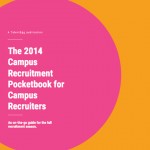It’s that time of year again! Yesterday, we opened applications for the 2013 TalentEgg Campus Recruitment Excellence Awards, which provide an opportunity for employers to be recognized within the industry and among your peers, and to gather valuable feedback from top students and recent graduates on your campus recruitment initiatives. The awards are open to all employers who hire college and university students and recent graduates in Canada.
We’ve added three new award categories for 2013 – Best Mobile Campus Recruitment Initiative, Best Campus Recruitment Brochure and Best Internship/Co-op Program – in addition to the five that were awarded last year to ensure that the best and most innovative campus recruitment strategies in Canada are being recognized.
Learn more about the awards categories and judging criteria
Applications are due February 28, 2013, so you still have lots of time to submit yours. With that time frame in mind, we wanted to put together some tips to help you improve your chances of being chosen as a winner.
Each application is comprised of a brief overview of your initiative and either requires or allows you to submit a supporting document in PDF format that elaborates on that overview. We received thousands of pieces of feedback from the 2012 judging period and noticed a few major trends when it comes to applications:
Tailor your applications for students and grads
The TalentEgg Awards are unique in that the winners are not decided by TalentEgg staff, a group of editors or even other employers. The winners are selected by a panel of hundreds of top students and recent graduates – in other words, your target audience for your campus recruitment initiatives.
This is the most important thing to keep in mind as you compile your applications. While a small few of them may be HR students, they’re also engineering, accounting, marketing, science, technology and arts students. The vast majority of them have never worked in campus recruitment and some of them may have no corporate work experience at all. They may not know what your organization is or what it does, or why you go about campus recruitment the way that you do.
So, if they can’t understand what you’re telling them, they may give you a lower score than a competing employer that they do understand. To avoid this, we recommend that you:
- Use terminology that everyone can understand
- Define words and phrases that are unknown outside of your organization or industry if you must use them
- Communicate in a Gen Y-friendly voice (i.e., casual and conversational but still professional)
- Speak directly to the wants and needs of students
Presentation isn’t everything, but it helps
An interesting trend we noticed as we analyzed the judges’ feedback for the 2012 TalentEgg Awards was that they tended to favour applications that were visually appealing and/or branded over basic, text-only applications. In fact, some of the judges were downright critical of some of the applications:
“The supporting media document looks as if it was created by a high school student, should consider having it done by a professional”
—Management Co-op student, University of Toronto“Very simplistic, I could have written that in 10 minutes, not much effort”
—Humanistic Studies student, McGill University“Very cool story, but would like to see some media or pictures to back up the application”
—Public Affairs & Policy Management student, Carleton University
Here are a few ways to ensure you stand out and appeal to the judges:
- Use style and branding that is similar to your other campus recruitment material
- Include visual evidence, such as photos, screenshots, logos, etc., to illustrate your application
- Help the judges connect with your organization by including pictures of your student/new grad employees and/or campus recruiters
Show your work
The judges consistently asked for more stats, facts, figures and numbers to help them understand how successful the applying employers’ initiatives had been, and favoured the applications that used solid numerical evidence to back up their claims. Based on this feedback, we recommend that you:
- Provide as much detail as possible about your initiative, but…
- Keep it concise – most of the judges will likely only spend a short time evaluating each application
- Include only the most relevant and impressive information
- Answer obvious questions such as “By how much?” and “How many?”
- Provide links to any social networking accounts, online media or additional information that may be relevant
We hope these tips will help guide you as you compile your applications over the coming weeks and months, and we look forward to another very egg-citing and successful awards season!
Apply for one or more awards now






Leave a Reply
You must be logged in to post a comment.